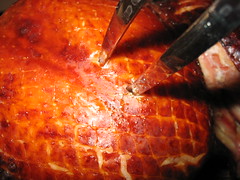| Mmmmm... Tryptophan! (Photo credit: The Rocketeer) |
While we tend to overlook it, we all know that food can make us sleepy. After eating a big turkey dinner, it’s hard to do anything but lie down and take a nap. This is because of a chemical you’ve probably heard a lot about in recent years: tryptophan. So what exactly is tryptophan? It actually allows your body to produce an amino acid called L-Tryptophan. This amino acid is essential in the production of the neurotransmitters serotonin and melatonin. These help slow down the nerve traffic in your brain, relax you, and allow you to think less and sleep more.
While you’ve already felt the relaxing powers turkey has, you probably aren’t too happy about the prospect of eating turkey before bed every single night. Well, the good news is that turkey isn’t the only source of tryptophan. This chemical is found in dairy products, soy, meat (especially poultry), nuts, fish, beans, eggs, hummus and most other high-protein foods. Eating a small amount of these foods shortly before bed time can help you sleep soundly.
The problem with many of the foods that contain tryptophan is that they also contain an amino acid called tyrosine. This produces chemicals that perk you up and make you more energized. Eaten alone, these acids will counteract each other produce no significant effects in either direction. The key to getting rest is to eat other foods that will allow you to utilize the tryptophan and not the tyrosine. Excellent foods for accomplishing this effect are carbohydrates. They encourage your body to produce insulin which “ties up” the tyrosine and allows the tryptophan to reach the brain without competition. Just be sure to avoid large amounts of carbs and simple sugars. This can lead to the production of too much insulin; causing you to wake up not long after you’ve fallen asleep.
| (Photo credit: Wikipedia) |
So, if you just can’t seem to settle down and get to sleep, try a late night meal containing nature’s sleeping pill: tryptophan. Just remember not too eat too much at night or you’ll likely wake up a few hours later. The most effective plan is to have a moderately sized dinner and a small snack containing protein and complex carbs an hour or two before bed. If you eat the right foods at bedtime, you’ll bed drifting off to dreamland in no time - without having to resort to harmful drugs.
And if stress is what's keeping you awake, be sure to check back Wednesday for some superfoods that help reduce stress!



No comments:
Post a Comment